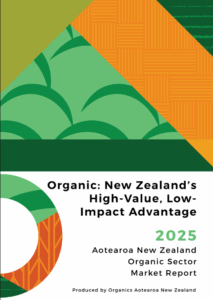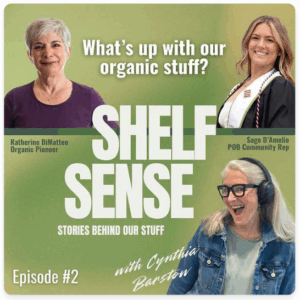“When the sun is shining, I can do anything; no mountain is too high, no trouble too difficult to overcome.” ~Wilma Rudolph
The rollout of SOE marked a major milestone in improving oversight and transparency across organic supply chains. But as with any significant shift, it’s brought new complexity for businesses and certifiers alike. This session offers a timely opportunity to check in on where we’ve landed—and where we still need to go.
In “SOE One Year On: Successes, Challenges, and Organic Opportunities” National Organic Program staff, certifiers, and industry leaders provide insights on enforcement trends, trade data, and the path ahead for leveling the playing field in organic.
Organic Trade Association members can access the session recording, and all the webinars in the series, for free.
As ever, we are here to provide customized solutions to any issues you may discover as you learn and may be facing as conditions shift.
Organic Regulatory Updates
 Tucker Returns to NOP; Summers Retires
Tucker Returns to NOP; Summers Retires
Dr. Jennifer (Jenny) Tucker returned on June 2 as Deputy Administrator of the USDA National Organic Program, following a temporary assignment as a leader in the USDA Specialty Crops Program.
Christopher Purdy, who has headed up NOP the past few months, will become the Chief Innovation Officer at USDA Agricultural Marketing Service.
In addition, Bruce Summers, Administrator of Agricultural Marketing Service since 2018, has retired.
Our take: Congratulations to Bruce and Christopher, and thank you for your service to the organic community! We hope when Christopher thinks of innovation, he remembers the forward-thinking, solution-oriented organic operations and businesses he’s gotten to know during his work with the National Organic Program. We look forward to working with Dr Tucker again. Jenny’s seasoned leadership is essential at this critical moment, and we thank her for agreeing to return to the post.
Comment on Canadian Organic Standards The Canadian Organic Standards are under review as part of a regular five-year cycle to ensure they reflect current research and standards of trading partners. The Organic Federation of Canada is conducting the review, and has prepared annotated documents showing proposed changes and the rational for the change. There are changes throughout standards, with significant changes for livestock operations and changes to seed requirements, nutrient use, and more. The public can comment on potential changes to the Canadian Organic Standards until July 29, 2025.
The Canadian Organic Standards are under review as part of a regular five-year cycle to ensure they reflect current research and standards of trading partners. The Organic Federation of Canada is conducting the review, and has prepared annotated documents showing proposed changes and the rational for the change. There are changes throughout standards, with significant changes for livestock operations and changes to seed requirements, nutrient use, and more. The public can comment on potential changes to the Canadian Organic Standards until July 29, 2025.
Our take: The devil is in the details, and this review is a detailed look at the entire set of Canada’s Organic Standards. If you have trading partners in Canada, take a look to see how the details could impact your business.
New Requirements for Canadian Organic Importers
- As of May 26, Canadian importers and brokers of organic products have new requirements for organic certificates. Importers/brokers must provide a copy of the organic certificate with each imported shipment as part of the integrated import declaration. Each uploaded organic product certificate will receive a unique reference number, which will be useful for multiple shipments.
- Beginning July 15, USDA will enforce the requirement that importers of Canadian organic products must be certified under the USDA organic regulations by a USDA accredited certifier. Canadian Organic Regime (COR) organic handling/processing certification no longer covers US importing activities. With the implementation of the Strengthening Organic Enforcement rules, Canada Organic Trade Association requested an allowance for additional time for Canadian businesses acting as US importers to obtain certification to USDA rules.
Our take: If you bring in products from Canada, check with your import broker to ensure they are following the new rules.
New Compostable Packaging Regulations Begin January 2026
California’s Compostable Product Standards Act (AB 1201) puts stringent requirements for products labeled “compostable” or “Home compostable”. Effective January 1, 2026, products sold in California with those labels must qualify as an allowable agricultural organic input under the U.S. Department of Agriculture’s National Organic Program (NOP). Most packaging currently labeled as compostable would not meet the new requirements. More.
Our take: If you are using compostable packaging—plastic, paper, whatever—and sell products in California, now is the time to get proactive and dive into the details of what this could mean for your business. Don’t count on a deadline extension to save you.
The Survey Says…
 New Zealand Organic Market Grows Again
New Zealand Organic Market Grows Again
The organic sector in New Zealand grew from NZ$723 million in 2020 to at NZ$1.18 billion, a a compound annual growth rate of 13% (8.1% excluding the food service sector), according to the annual market report from Organics Aotearoa New Zealand. Food service sector numbers were included in the report for the first time, and represent NZ $190 million. Exports are valued at NZ$606.7 million, with fruits and vegetables, dairy and wine as top export categories. At NZ$172.8 million and 28.5% of all New Zealand exports, the United States is New Zealand’s leading export market.
Our take: Including food service statistics bodes well for New Zealand’s domestic organic market. Completing their stalled organic standards would reduce market uncertainty and open additional international trade opportunities.
Is No-Till Farming Regenerative?
According to the report “Rethinking No-Till” from Friends of the Earth, 1/3 of total annual pesticide use (including herbicides, insecticides and fungicides) in the US can be attributed to no-and minimum-till corn and soy production, primarily due to the heavy use of herbicides on those farms. The pesticides widely used in conventional no-till crops damage soil health, harming both the soil microbiome and invertebrates like worms and beetles, and essential pollinators and other wildlife. Furthermore, the report summarizes research that shows no clear relationship between no-till farming and carbon sequestration, putting the climate-friendly claims of conventional no-till systems into question. No-till and reduced tillage is the practice most frequently included in definitions and descriptions of regenerative agriculture, which is not regulated at the federal level.
Our take: Organic products (including regenerative organic products) must meet strict regulations that encompass both farm practices and all post-harvest handling. Organic regulations do not allow these harmful herbicides, and organic farms are more likely to sequester carbon and protect the environment. Having federal regulations in place enhances consumer confidence and keeps a level playing field for businesses.
Organic Seed Report Yields Insights
In response to the Fall 2024 National Organic Standards Board’s discussion about organic seeds, the International Fresh Produce Association surveyed both farmers and specialty crop seed manufacturers about the availability and quality of organic seeds. Their report reveals that stakeholders share concerns about costs to produce and use organic seeds. A selection of organic seeds varieties is easier to find for some crops, including cilantro, beets, thyme, sage and cover crops, but still more difficult to find than untreated non-organic seeds. One recommendation to reduce barriers to organic seed production and use was to better develop crop protection tools to make organic seed production less risky, especially given the long production times for some fruit and vegetable varieties.
Our take: We’re not surprised about the response, and the concerns of seed producers and the farmers that use their products fit with what we hear from our community. Through his work on the board of the Organic Seed Alliance, our COO John Foster has worked to encourage organic seed production to meet the needs of both farmers and seed growers.

Taking a Count
Public comment on proposed rules
12,633: Rescinding Organic Pet Food and Mushroom Standards (2025)
39,112: Organic Livestock and Poultry Standards (2022)
1,525 Strengthening Organic Enforcement (2020)
275,603: National Organic Program (1997)
Organic Community
 Meet Our Team
Meet Our Team
For over 20 years, Joe Dickson has driven the creation of innovative standards, certification programs and educational content that help shoppers, brands and retailers align consumer intent with real impact throughout the supply chain. One of his strengths is creating dynamic educational content to help people – consumers, industry leaders, regulators and others – understand technically complex issues in agriculture, ingredient safety and food systems.
Joe served on the National Organic Standards Board from 2010-2015 and has established a solid track record of developing standards and certification programs in food, agriculture, cosmetics and textiles, along with broad and deep experience in FDA and USDA government affairs, PR and communications, content strategy, and investor relations. An experienced consultant and team player, Joe has built his career developing rigorous standards and accessible, relatable information that builds deep trust between consumers and brands.
Got Organic Farming Questions? Check the Research Hub
Organic Farming Research Foundation’s Organic Research Hub includes research summaries, technical tools, guides and resources that support organic and transitioning farmers across the US. Searchable by keyword, region, crop category, production topic, and more, this free resource also offers an Organic Extension Directory to connect farmers with organic experts in their state or region.
Our take: Having good information at your fingertips can save time and boost effectiveness. Thank you, OFRF for putting this together.
 In the News: Katherine DiMatteo
In the News: Katherine DiMatteo
Katherine DiMatteo, one of our Senior Associates, is the featured guest on a new podcast from Cynthia Barstow—ShelfSense: Stories Behind Our Stuff.
On “What’s Up with Our Organic Stuff?” Katherine discusses how the organic standards developed, and what makes the organic label special. Fellow guest Sage D’Amelio chimes in with perspectives from Gen Z. If you want the short version of the history of the US organic label, this is it. Good work, everyone!

